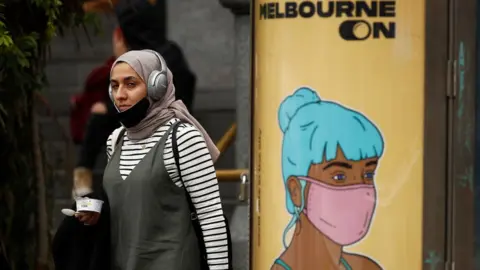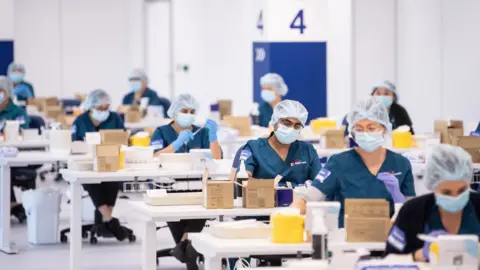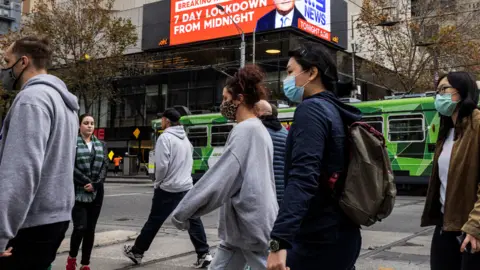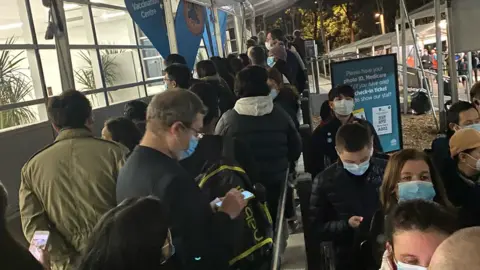Covid: The Australian millennials desperate for vaccines
 Getty Images
Getty ImagesThe hot, new thing that young people want in Australia right now? It's not the latest Yeezy sneakers or an iPhone - it's a Covid vaccine, preferably the much coveted Pfizer.
For most millennials it's off-limits right now, a reality many argue is holding them back - and risking their future.
Four months into Australia's vaccine programme, most people aged under 40 still aren't eligible to get the jab. The country has been running a rollout in stages based on age and vulnerability.
The process has also been held up by supply issues, delivery failures and concerns over the AstraZeneca vaccine.
Earlier this week in Sydney, the BBC observed a long queue outside a vaccination hub made up of many people who appeared to be millennials, aged between 25 and 40.
Some qualified for the jab despite their age because they were a household contact of a frontline worker. They jumped at the chance to be vaccinated.
Julia Bald, a 28-year-old music writer, walked out of the clinic injected with "this marvel of modern medicine" and a sense of elation.
"I think everyone's desperate to get it now," she told the BBC, referring to her friends.
"You know that classic meme?" she says, referencing a skit where US internet comedian Eric Andre throws himself at a fence. "Everyone's just like: 'Let me in! Let me in please! I want it now!'".
Contrast to complacency
For many millennials, the vaccine represents protection for their parents, an ability to resume travel and a step toward the new normal.
The enthusiasm from many younger Australians contrasts heavily with their parents' generation - where hesitancy toward the jab has become a major problem, experts say.
Since May, anyone aged over 50 has been able to get vaccinated with the AstraZeneca jab. Yet some have been reluctant following reports of the extremely rare risk of blood clots associated with that vaccine.
Hesitancy has seen some older Australians cancel vaccination appointments or refuse to get the jab when it was the only option offered at a clinic.
The government also recommends anyone under 50 get an alternative to the AstraZeneca shot. Right now, that only leaves Pfizer - a vaccine Australia doesn't have in large supply.
 Getty Images
Getty ImagesBecause infections have been so low in Australia, officials determined that younger people could wait till more Pfizer shots, or another mRNA vaccine, become available.
Sarah Martin, 36, started a petition to get younger people access after she secured a jab at a near-empty clinic a few weeks ago.
"There were no lines at the mass vaccination centre, so I begged for it. I was lucky," she said. The petition carries the slogan "It's not jumping the queue if there is no queue!" and has gained nearly 4,000 signatures.
Not a 'priority'
A threatening outbreak in Melbourne has left many young people - without an option to be vaccinated - feeling vulnerable and let down.
A cluster of infections has pushed Australia's second-most populous city, and the state of Victoria, into lockdown. It's the fourth one endured by residents since the pandemic began.
So far, only 2% of Australians have been vaccinated. Many locals are furious they're being trapped at home again, when vaccines have been available around the world for seven months.
This feeling is particularly strong among millennials, who look longingly at social media, where vaccinated friends in the UK and the US are moving on.
Aashna Pillai, 29, says pushing her generation to the bottom of the vaccine list exacerbates feelings already held about being left without support.
She's worked four different jobs over the past year to stay afloat.
"Our generation is kind of viewed like 'Oh, they're young, they'll recover from Covid, they'll be fine', so we're pushed off the priority list," she says.
But Ms Pillai says grinding through another lockdown - instead of using vaccines to find a way out of the pandemic - is holding young people back.
 Getty Images
Getty ImagesDecisions made at this time are crucial to setting up life for the decades ahead, she says. Opportunities are being lost - whether it's a dream of moving overseas or feeling confident to start a new career.
"Coming into this I was like, do I choose to have a family or do I choose to go back to university? I've already missed out on a full year and this vaccine delay is now just another setback."
Ms Pillai is joined by a growing number of experts in calling for vaccines to be made open to all, given the low take-up among older generations. If doses are available, why should young people be made to wait, they ask.
Lack of clarity
Further fuelling anxiety for young Australians is the lack of transparency around the vaccine rollout.
Millennials don't know when the vaccine programme will be opened to them, or even how many Pfizer doses are available now.
At this stage, Australia's government has pledged only that all adults will receive their first shot by the end of the year.
Less than 20% of the Australian population has received one dose so far, compared to 67% in the US, and 75% in the UK.
"I'm surprised by the lack of information around," says Ms Bald. "It seems to be more of a word-of-mouth thing rather than an official government communication kind of vibe."
Millennials say they are left to find information through the "grapevine" rather than official sources. That has led, in some cases, to them scoring a jab.
The BBC has confirmed multiple instances where vaccination sites have provided a shot to those who show up because they have supplies that will expire if they aren't used.
They include cases where a non-eligible millennial accompanying their parents, or an eligible partner, received a vaccine just because they showed up.
Tarun, 31, told the BBC he hadn't realised he wasn't eligible for a shot when he first booked it in. But when he turned up at the clinic, the nurses were happy to give it to him.

"I think it was fair for them to say 'since you're here, you might as well get the shot'. Because eventually that's the aim right?," he says.
"You want everyone to get their shot and if there's someone who's not coming in, and there's a spot to fill, you might as well get someone in."
Confusion over the rules has left others even more anxious to get the jab. There is a fear of missing out - particularly as reports emerge of potential travel privileges given to those who are vaccinated.
"I want the vaccine so bad," says Ms Pillai.
"I'm in this crucial part of my life where I'm literally being forced to just sit at home because we don't have it.
"And say, I do finally get it in a year's time - that will be just a whole another year where I can't push forward, where I'm playing catch-up."
